SUMMARY
This is AI generated summarization, which may have errors. For context, always refer to the full article.
![[OPINION] Sara and Bongbong’s foreign policy](https://www.rappler.com/tachyon/2022/04/TL-Sara-Bong-Foreign-Policy-Aprll-21-2022-02.jpg)
Rarely do our national elections focus on international relations. We have enough internal problems for the political elite to fight about. The dominance of bilateral relations with the United States also tended to marginalize even issues closer to home, like the Philippine claim to Sabah or attempts to build regional associations, neither of which gained much public interest. Other global issues, such as our participation in the Vietnam War or in the 2003 Coalition of the Willing against Iraq, mattered mainly in the context of US-Philippine relations.
The escalation of the Chinese Communist Party’s campaign to appropriate the South China Sea (SCS) gave the 2016 elections a high-profile foreign policy issue. In violation of international law, the PRC, under Xi Jinping since 2012, invaded the Philippine EEZ, denying Philippine fishermen access to traditional fishing grounds. Claiming historic rights, the PRC occupied Philippine atolls, expanded them into islands, destroying the marine environment, and prepared them, against its own promises, for military use.
The PNoy Aquino Administration resisted this assault on the high seas, holding superior PRC naval forces at bay around the Scarborough Shoal in 2012, until persuaded by the US to a mutual withdrawal of naval forces, to which it adhered but on which China reneged. It then raised the issue for international arbitration in 2013 and obtained from the Hague Permanent Court of Arbitration a judgment, applauded internationally, rejecting the PRC’s contrived 9-Line boundaries that made the SCS a Chinese lake.
For Filipinos, the case involved the fundamental duty of the state to defend national sovereignty and patrimony. But Mayor Duterte had no interest in foreign policy. His campaign’s 15-point Legacy Agenda included, at No. 13, Ending Traffic Congestion in Metropolitan Areas. Nothing on foreign policy at all, despite the PRC threat to Philippine rights in the SCS. It was an issue he preferred to avoid altogether and dismissed with the joke that he would jet-ski to plant the Philippine flag on its EEC boundary. The humor fell flat, though desperate Pangasinan fishermen believed that the promise would protect them from harassment by bigger Chinese commercial vessels and armed coast guard ships that had already cost loss of livelihood and lives.
As president, Duterte asserted his sole, executive power to set foreign policy. On substantive issues, his personal and ideological inclinations led him to favor authoritarian China over liberal-democratic America. But the most deeply felt resentment against the United States was probably its persistent condemnation of human rights abuses during his term as Davao mayor and in his drug war that led to on-going investigations by the International Criminal Court.
Two factors appeared to guide Duterte’s policy towards China. First, an almost paralyzing fear of Chinese power. Initially puzzling, he congratulated himself on his foresight in bringing cabinet-level officials to a 2017 Beijing meeting with Xi-Jinping. The point appears to be the availability of officials to confirm that Xi threatened war, if the Philippines were to attempt oil exploration in the SCS. The threat justified his cautious approach to China and, consequently, his second preferred approach, cultivating Xi Jinping’ friendship and favor. Duterte’s strategy has been to temporize, to keep China friendly by deferring contentious problems to the distant future. He can then claim credit for something that did not happen, a catastrophic war with China that nobody wants, while leaving to his successors the risk of ignored problems becoming insurmountable.
The strategy forgets the basic rule of international relations; nations have no permanent friends or enemies, only permanent interests. The status quo benefits China, allowing it to continue carving up salami slices of their target goals, while simultaneously tightening the noose around adversaries. In six years, Duterte has not articulated any plans for improving the Philippines’ negotiating position vis-à-vis China – beyond expressing hope that friendship with Xi will bring Chinese investments to strengthen the economy.
Can we expect from Sara-Bong improvements in our SCS situation that did not happen in Duterte’s watch? Sara is likely to follow her father’s footsteps. Marcos, Jr. has already demonstrated fidelity to Duterte’s policy of courting Chinese support. Neither has shown much interest or competence in the field of international relations, as demonstrated in their response to the Ukraine war.
Marcos Jr. declared that the Philippine government should not take a stand on the Russia-Ukraine war because “we are not involved, except for our nationals [about 300].” Sara supported her principal: the Philippines must only take a stand if its “interest is at risk. Perhaps, they were simply deferring to Duterte’s reminder on March 1 of his personal friendship with Putin and his stand that the Philippines should not take sides. Surprisingly, the Philippines voted on March 2 for the UN General Assembly resolutions condemning Russian aggression against Ukraine.
The Russian invasion of Ukraine has confirmed that a Cold War II winter has come. We need a competent and credible president who can mobilize and manage the best talent to cope with its challenges. Robredo has joined the ranks of the United States, the European Union, 14 Asia-Pacific countries (including Australia, Japan, and South Korea), and eight, including the Philippines, of the ASEAN 10 in condemning Russian aggression. Sara-Bong is in the camp of China and nine other countries that abstained from the UN resolution. A vote for Sara-Bong places the Philippines in this camp.
But can Sara-Bong really choose the company they keep? Duterte is under investigation for crimes against humanity. Marcos Jr. is an even more precarious legal position. Conviction on human rights violations and plunder in US courts and associated unresolved cases place him in the cross-hairs of the Global Magnitsky Act that enforces international accountability for these crimes. As president, Marcos Jr. may need special arrangements to avoid arrest outside Philippine territory.
In a period of critical economic, climate and security challenges – all requiring international collaboration – can we risk leaders laboring under such a debilitating liability? – Rappler.com
Edilberto de Jesus is a senior research fellow at the Ateneo School of Government.
Add a comment
How does this make you feel?
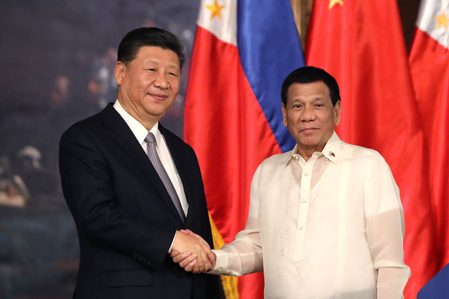

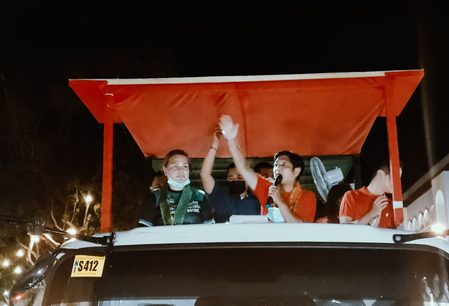
![[WATCH] In The Public Square with John Nery: Preloaded elections?](https://www.rappler.com/tachyon/2023/04/In-the-Public-Square-LS-SQ.jpg?resize=257%2C257&crop=414px%2C0px%2C1080px%2C1080px)
![[Newspoint] 19 million reasons](https://www.rappler.com/tachyon/2022/12/Newspoint-19-million-reasons-December-31-2022.jpg?resize=257%2C257&crop=181px%2C0px%2C900px%2C900px)

![[OPINION] The long revolution: Voices from the ground](https://www.rappler.com/tachyon/2022/06/Long-revolution-June-30-2022.jpg?resize=257%2C257&crop=239px%2C0px%2C720px%2C720px)
![[OPINION] I was called a ‘terrorist supporter’ while observing the Philippine elections](https://www.rappler.com/tachyon/2022/06/RT-poster-blurred.jpeg?resize=257%2C257&crop_strategy=attention)






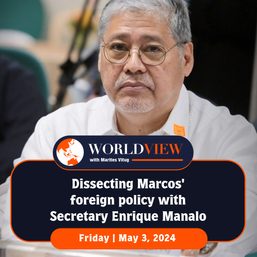
![[OPINION] Expectations for Philippines-US-Japan trilateral cooperation: A view from Japan](https://www.rappler.com/tachyon/2024/04/tl-ph-usa-jp-cooperation.jpg?resize=257%2C257&crop=447px%2C0px%2C1080px%2C1080px)
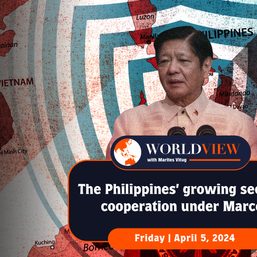
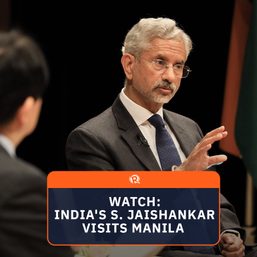


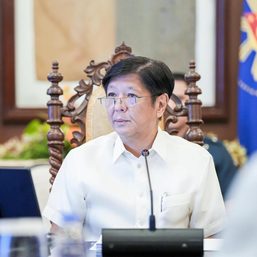
![[WATCH] #TheLeaderIWant: Filipino voters sound off on community issues a year before 2025 elections](https://www.rappler.com/tachyon/2024/05/filipino-voters-sound-off-on-community-issues-1.jpg?resize=257%2C257&crop=276px%2C0px%2C720px%2C720px)
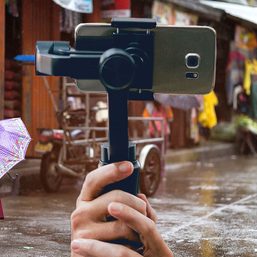

![[ANALYSIS] The West Philippine Sea dispute and the stock market’s performance](https://www.rappler.com/tachyon/2024/06/thought-leaders-west-ph-sea-dispute-and-market-performance.jpg?resize=257%2C257&crop=134px%2C0px%2C720px%2C720px)




There are no comments yet. Add your comment to start the conversation.